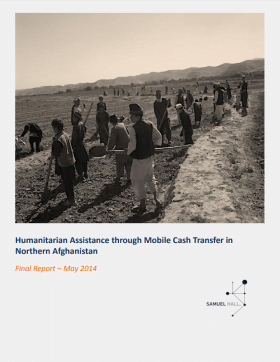Humanitarian Assistance through Mobile Cash Transfer in Northern Afghanistan: An evaluation of a DFID pilot project in Faryab, Jawzjan, and Samangan
In response to the 2011 severe drought that pushed vulnerable rural households into food insecurity in 14 provinces of Northern Afghanistan, DFID has committed to address emergency needs in northern Afghanistan with nutrition, food security and farming inputs. Samuel Hall Consulting, a Kabul-based research firm, was commissioned to conduct a survey between June and September 2012, during which time a pilot initiative was launched in four districts of the Northern provinces of Faryab, Jawzjan, and Samangan to test an innovative approach to help drought-affected farmers achieve food security by delivering cash using mobile phone technology.
The purpose of this evaluation is to examine the use of cash transfers via mobile phone, rather than the impact of the programme itself. It will examine whether the technology used was appropriate, whether it could reduce the use of coping strategies and whether it would work in the challenging humanitarian context of Afghanistan. In addressing these questions, this independent evaluation will examine the overall efficiency, effectiveness, transparency, and value for money of setting up emergency short-term, cash-based projects to disaster affected populations. Differences will be explored between the cash transfer scheme defined by DFID and implemented by its partners (ACTED, Action Aid, and Afghan Aid) and other humanitarian interventions, specifically the USAID and WFP programmes (the latter of which is food aid). The main objectives of this study are therefore twofold:
What is the result of each assistance programme (mobile cash transfers and USAID/WFP) on the humanitarian needs of the target population as measured by standard humanitarian criteria?
What are the primary considerations when deciding whether to establish mobile phone payment transfers in a humanitarian context?



